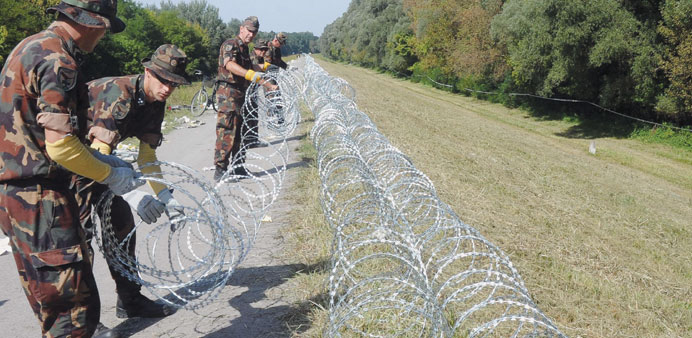Hungarian soldiers lay barbwire yesterday along the border with Croatia, near Kulked village.
AFP
Beremend, Hungary
Overwhelmed Croatia began bussing hundreds of migrants yesterday to its border with Hungary, threatening to create a new flashpoint in Europe’s worst migration crisis since World War II.
The move came as a string of countries in the Balkans closed their borders, shutting off key migration routes to western Europe and leaving thousands stranded.
And as Croatia said it had reached saturation point after more than 14,000 people arrived in 48 hours, it began channelling the flow towards its northeastern border with Hungary, a frontline EU state which has vowed to “defend its borders” from the influx.
Hours earlier, Budapest started building a new anti-migrant fence along part of the Croatian border, setting the stage for a fresh diplomatic confrontation as Budapest accused Zagreb of pushing migrants to break the law by moving them to the Hungarian frontier.
With no let-up in the flow of people desperate to find shelter in Europe, new figures showed the European Union had received almost a quarter of a million asylum requests in the three months to June.
And as another toddler’s body washed up on the shores of western Turkey, new figures from the International Organisation for Migration (IOM) showed that nearly 474,000 people had so far this year braved perilous trips across the Mediterranean to reach Europe.
After Hungary sealed off its southern border with Serbia earlier this week, thousands of migrants and refugees headed westwards, seeking to open up a new route westwards through Croatia and Slovenia into Austria.
But after two days of letting people in, Croatia said yesterday that it had reached saturation point, closing seven of the eight crossings along its eastern border with Serbia.
“As of today we will start applying new methods,” Croatian Prime Minister Zoran Milanovic said as Zagreb began dispatching dozens of buses to the frontier. “What other choice do we have?”
“Hungary has closed off its border with barbed wire, that’s not a solution, but these people remaining in Croatia is not a solution either.”
An AFP correspondent in the Hungarian border village of Beremend counted 22 coaches, each carrying around 60 people, arriving on the Croatian side where they were met by some 250 Hungarian police and soldiers.
Two of the buses were allowed to cross, with the passengers disembarking and getting onto Hungarian buses which headed off to an unknown destination, he said.
Shuttle services were running from Tovarnik on its eastern frontier with Serbia and Beli Manastir, a town near the Hungarian border, where many police were deployed on the streets and around 10 empty buses stood waiting.
To the east, Slovenia also announced it was suspending all rail links with Croatia until the end of the day as migrants began massing on its southeastern border.
At Harmica, a small village on Croatia’s northwestern border with Slovenia, buses were arriving every hour, bringing more and more people as Slovenian police watching from the other side of the fence, some peering through binoculars into the surrounding corn fields.
“I just want to cross the border,” said a young Syrian student wearing a black Iron Maiden t-shirt, a sad smile on his face as he stood by the shallow river which marks the border.
As eastern European states scrabbled to manage the human tide at their borders, a top EU official sought to reassure them, insisting the bloc would not leave them to fend alone.
“You are not a parking lot for refugees, you are also victims of the situation and we won’t leave you,” EU Enlargement Commissioner Johannes Hahn told the Macedonian parliament.
But his words did little to assuage the strong feeling in Budapest, which accused Croatia of breaking EU laws by ferrying migrants to its border.
“The Croatian government is transporting migrants – in contravention of the laws in force in the EU – towards the Hungarian border instead of giving them a place to stay and looking after their needs,” charged Foreign Minister Peter Szijjarto, accusing Zagreb of encouraging them to “break the law”.
UNHCR spokesman Adrian Edwards said that chaos and confusion was filling the vacuum left by the “absence of a coherent and united response”, saying that two key EU meetings next week were “crucially important”.
“These occasions may be the last opportunity for a positive, united and coherent European response to this crisis. Time is running out,” he warned.
Official figures released yesterday showed the EU received 213,000 asylum applications between April and June, up 85% from the same period in 2014.
Germany had the highest number, with more than a third of the total, while Hungary received the most applications relative to its population size, the Eurostat agency said.
Earlier this week, the UN rights chief suggested that Budapest’s policies were apparently guided by “xenophobic and anti-Muslim views”.
But for one Syrian family, there was good news as Pope Francis put them up in a Vatican apartment, aides revealed yesterday.
The Christian family is the first of two that the Catholic leader has promised to help as part of a broader Church effort to help shape Europe’s response to an ongoing migration crisis partly caused by the conflict in Syria.

